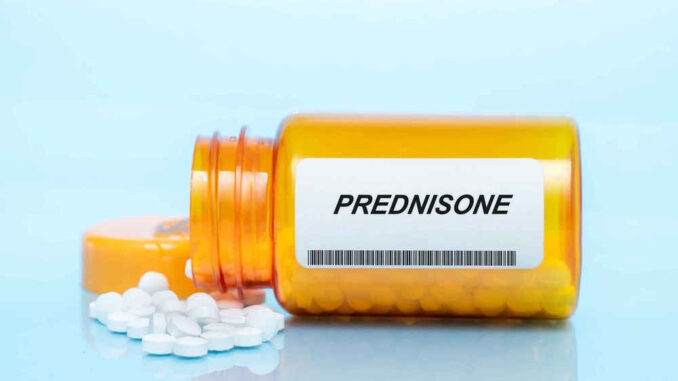
This article was updated on August 26th, 2023
As a veterinarian, I often prescribe prednisone for dogs for many different types of diseases. While many times this can be safely administered to your dog, there are some side effects and some instances when your dog should not take prednisone.
What is Prednisone?
Prednisone is a steroid that is used to help decrease inflammation or treat steroid deficiencies. This medication in high dosages will suppress your dog’s immune system or be used as a chemotherapy agent.
Is Prednisone safe for all dogs?
Prednisone is not recommended for young dogs, dogs who are diabetic or dogs with fungal infections. This medication suppresses your dog’s immune system and hinders the ability of them to fight infections and for wounds to heal.
If your dog is taking prednisone they should be on a tapering dosage meaning they are slowly weaned off the medication over 3 to 4 days. Suddenly stopping this medication can cause your dog to develop itrogenic Addison disease. Addison can be a life-threatening issue.
How much Prednisone can my dog have?
The dosage of prednisone is 0.5 to 2mg/kgs. Most dogs will take about 0.25mg per pound to help with inflammation. The higher end of the dosage is used for immune suppressants and given to dogs with autoimmune disease or cancer.
Is a 20 mg dose of prednisone safe for dogs?
Most large dogs will safely tolerate 20mgs of prednisone. Smaller dogs will take a smaller dosage. If your dog is having GI side effect of this medication it is best to offer it on a full stomach or give it with food as this will help prevent vomiting and diarrhea.
What are the side effects?
There are some side effects that are seen when a dog take prednisone. These include
- Drinking more water
- Urinating more frequently
- Wanting to eat more
- Vomiting
- Diarrhea
- Weight gain
- GI ulcerations especially at higher dosages
- Increased liver enzymes
- Delayed growth in young animals
The most common signs seen are drinking more water and the need to urinate more. This issue will quickly stop once you have discontinued giving your dog prednisone.
If you notice any of these signs it would be best to call your vet right away. They will advise you on if you can stop this medication or if you need to slowly decrease the dosage to help with the side effects.
How do I know if my dog had too much?
If your dog has had too much prednisone you will notice that they are urinating more often and drinking a lot of water. They may also have mild GI issues.
Can dogs overdose on Prednisone?
It is very hard for your dog to have any harmful dosages from prednisone. The most common side effect if your dog has too much prednisone is GI issues such as vomiting, and diarrhea.
If this medication is given along with NSAIDs it can cause GI ulcers that can rupture leading to an infection in your dogs abdomen. This can be a life-threatening emergency if not treated right away.
You should always ask your vet before giving any medication along with prednisone to make sure that your dog will not have any adverse reactions from taking these medications.
What dose is fatal to dogs?
Short term predisone rarely causes any issues in dogs. If your dog needs to take prednisone for a long time it can effect liver values and cause issues with muscle wasting. Long-term use of any type of steroid can suppress your dog’s body’s ability to make steroid hormones for themselves. When stopping steroids their body will take some time to readjust to not receiving this medication and may cause them to have Addison’s disease. Their body can also receive too many steroid hormones causing them to have Cushing’s disease. Both of these issues usually resolve without any issues for your dog.
Final thoughts
If your dog is taking prednisone, knowing the side effect of this medication can help you prevent many unwanted issues. As soon as you notice that your dog is having issues, it is best to talk to your vet right away. They may recommend that you decrease the dosage or stop this medication altogether. Never discontinue this medication abruptly as it will cause other severe issues.
Disclaimer: This website's content is not a substitute for veterinary care. Always consult with your veterinarian for healthcare decisions. Read More.


Be the first to comment